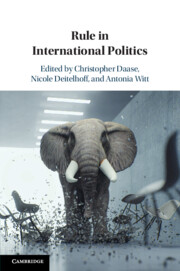Book contents
- Rule in International Politics
- Rule in International Politics
- Copyright page
- Contents
- Contributors
- Acknowledgements
- Introduction
- Part I Theorizing Rule
- Part II Practicing Rule
- 5 How Rule Generates Its Own Authority
- 6 The Region as Site of Rule
- 7 Law, Anarchy, and Rule
- Part III Resisting Rule
- Index
- References
5 - How Rule Generates Its Own Authority
from Part II - Practicing Rule
Published online by Cambridge University Press: 15 June 2023
- Rule in International Politics
- Rule in International Politics
- Copyright page
- Contents
- Contributors
- Acknowledgements
- Introduction
- Part I Theorizing Rule
- Part II Practicing Rule
- 5 How Rule Generates Its Own Authority
- 6 The Region as Site of Rule
- 7 Law, Anarchy, and Rule
- Part III Resisting Rule
- Index
- References
Summary
Global governance entails a “transnationalization” of what is conventionally described as international authority, vested in multilateral organizations such as the UN. This process entails an increased reliance on private or non-state actors, and on voluntary and marked-based mechanisms of governance. In many cases, so-called “private” authority is central to global governance arrangements. This aspect of contemporary global governance raises questions about how the authority to govern is established. If authority is not delegated by states, but seized by private actors, our theories for explaining its emergence becomes important. I develop an argument about how authority can be established from scratch, without prior authority, by virtue of the sheer facticity of political rule. In this conception, authority is not the basis for political rule, but a result of it. I explore this dynamic with regards to different issue-areas in multilateral settings.
- Type
- Chapter
- Information
- Rule in International Politics , pp. 115 - 135Publisher: Cambridge University PressPrint publication year: 2023
References
- 1
- Cited by

